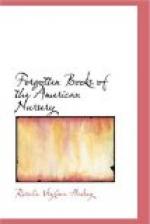By eighteen hundred and thirty-five the “Annual” was in full swing as a popular publication. Then an international book was issued, “The American Juvenile Keepsake,” edited by Mrs. Hofland, the well-known writer of English stories for children. Mrs. Hofland cried up her wares in a manner quite different from that of the earlier literary ladies. “My table of contents,” she wrote in her introduction, “exhibits a list of names not exceeded in reputation by any preceding Juvenile Annual; for, although got up with a celerity almost distressing in the hurry it imposed, such has been the kindness of my literary friends, that they have left me little more to wish for.” Among the English contributors were Miss Mitford, Miss Jean Roberts, Miss Browne, and Mrs. Hall, the ablest writers for English children, and already familiar to American households.
Mrs. Hofland, herself, wrote one of its stories, noteworthy as an early attempt of an English author to write for an American juvenile public. She found her theme in the movement of emigration strong in England just then among the laboring people. No amount of discouragement and bitter criticism of the United States by the British press was sufficient to stem appreciably the tide of laborers that flowed towards the country whence came information of better wages and more work. Mrs. Hofland, although writing for little Americans, could not wholly resist the customary fling at American life and society. She acknowledged, however, that long residence altered first impressions and brought out the kernel of American character, whose husk only was visible to sojourners. She deplored the fact that “gay English girls used only to the polished society of London were likely to return with the impression that the men were rude and women frivolous.” This impression the author was inclined to believe unjust, yet deemed it wise, because of the incredulous (perhaps even in America!), to back her own opinion by a note saying that this view was also shared by a valued friend who had lived fourteen years in Raleigh, South Carolina.
Having thus done justice, in her own eyes, to conditions in the new country, Mrs. Hofland, launched the laborer’s family upon the sea, and followed their travels from New York to Lexington, Kentucky, at that time a land unknown to the average American child beyond some hazy association with the name of Daniel Boone. It was thus comparatively safe ground on which to place the struggles of the immigrants, who prospered because of their English thrift and were an example to the former residents. Of course the son grew up to prove a blessing to the community, and eventually, like the heroes in old Isaiah Thomas’s adaptations of Newbery’s good boys, was chosen Congressman.




